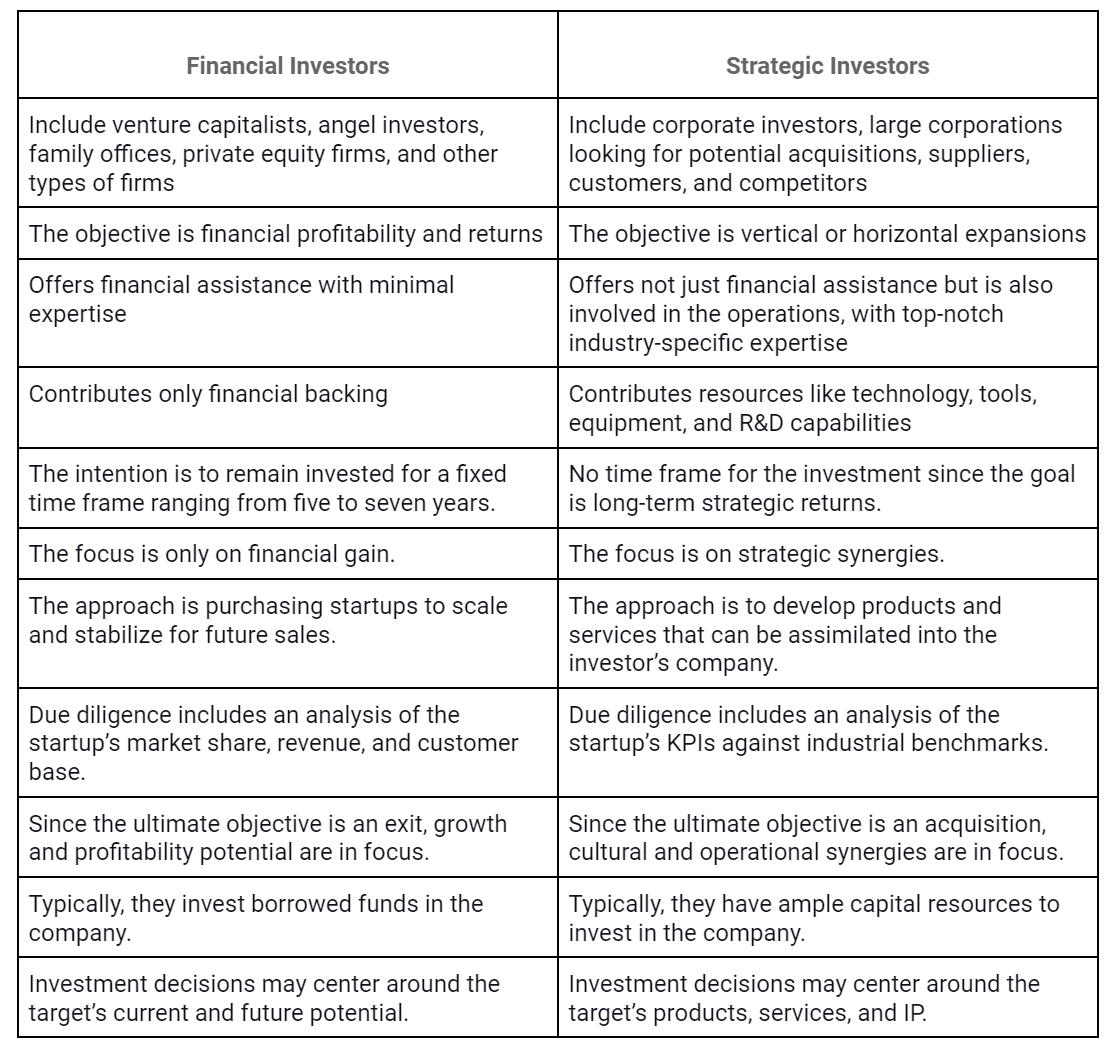When exploring the optimum sources of capital for your startup, the issue of financial investors vs. strategic investors is likely to come up. Before grabbing what seems to be the best available option to you, it’s advisable to do the necessary research.
Before accepting the offer, understand the long-term effects of both funding options on your startup’s future scalability and profitability. The foremost question you should explore is the investor’s end goals in backing your company and the returns they’re expecting.
Ultimately, you’ll go with the investor whose goals align with your company’s mission and vision. Of course, you always have the option to bring in both categories. However, be aware of the potential conflict of interest when each class appoints a representative to your board of directors.
Read ahead for detailed information about financial investors vs. strategic investors and how to pick the right option. Your decision will also depend on the stage where your business is at.

*FREE DOWNLOAD*
The Ultimate Guide To Pitch Decks
Understanding Financial Investors
Financial investors are typically entities looking to profit from the capital they invest in startups. Their objective is to assist in the growth, ensuring that their capital appreciates over time and brings them maximum returns. These entities don’t necessarily operate primarily in your sector.
Although they may require that a representative board member be appointed to your board, their involvement is minimal.
You can only expect occasional guidance without any real expertise in the field. When evaluating a company as a potential candidate for funding, they’ll focus on its growth potential.
Understanding Strategic Investors
When strategic investors invest in startups, their objective is not just financial, though that’s also a factor. These entities are more concerned with the strategic advantage and value the investment can bring. Their objective is to gain access to broader markets and a competitive edge.
These entities may also look for innovative technologies that can enhance their operations with the ultimate goal of acquiring the startup.

Raise Capital Smarter, Not Harder
- AI Investor Matching: Get instantly connected with the right investors
- Pitch & Financial Model Tools: Sharpen your story with battle-tested frameworks
- Proven Results: Founders are closing 3× faster using StartupFundraising.com
Financial Investors vs. Strategic Investors

Additional Factors to Consider When Choosing Financial or Strategic Investors
Investment Approach
Financial investors are primarily concerned with creating value. This is why they are open to backing startups that are struggling or in their early stages. These investors work according to the turnaround and buy-and-build approaches.
They invest capital and assist founders with access to their networks and hiring exceptional talent. You might consider them consultants who can give you exceptional business insights. They work with a large portfolio of companies, and you can leverage their commercial expertise to scale the venture.
While strategic investors are also concerned with creating value, their approach is different. They are laser-focused on making sure their investment is developing marketable IP, products, and services.
Usually, their ultimate goal is acquiring the startup outright or allowing it to continue operating as a subsidiary. In any case, your startup’s success works in the investor’s interests.
Due Diligence
The due diligence process is one of the critical distinctions between financial investors vs. strategic investors. Financial investors look at financials like P&L statements and balance sheets along with the market share the brand commands.
They’ll also consider the products, potential growth, and performance reviews going back a few years in terms of data. These statistics indicate whether the company has what it takes to succeed. That’s because their end goal is to make a profitable exit.
Strategic investors are not so concerned with the financials since the capital they invest can cover the shortfalls. Their primary focus is on the synergies they can achieve post-acquisition. Their due diligence processes will be more about the startup’s culture, mission statement, and vision.
The investors will want to ensure that the synergies are an ideal fit and that their target will assimilate seamlessly.
Decision-Making Processes & Board Seats
Financial investors may appoint a board representative of their choosing. This financial advisor’s task is to ensure that the capital is used appropriately and economically. While strategic investors may also appoint a board member, their objective is to steer the startup’s R&D.
Creating a product development roadmap ensures that your startup remains on track to manufacture the products they need. The board member may influence decision-making when it comes to product design and ensure that specifications match the investor’s requirements.
Most strategics may purchase products on condition that the startup cannot sell to competitors. Or, you cannot use the IP they sponsored to develop products for the open market. The board member ensures that the founder adheres to the term sheet conditions.
Keep in mind that in fundraising, storytelling is everything. In this regard, for a winning pitch deck to help you here, take a look at the template created by Silicon Valley legend, Peter Thiel (see it here) that I recently covered. Thiel was the first angel investor in Facebook with a $500K check that turned into more than $1 billion in cash.
Remember to unlock the pitch deck template that is being used by founders around the world to raise millions below.
Core Talent and Team
Both financial investors and strategic investors scrutinize the core talent working in the company. Financial investors examine the employee structure, their ages, performance, average tenure, and track record in the company.
For instance, the number of leads and revenues the sales team has brought in within a specific time interval. Or the success ratios of the R&D team in terms of the number of products they’ve developed. Ultimately, financial investors need impressive metrics as criteria for funding.
Strategic investors focus on the core team for different reasons. Performance is again key here but in terms of employee qualifications and capabilities. And, primarily the potential synergies between the workforces of the target and investor companies.
Since strategic investment is also about horizontal expansion, the investor may want detailed data about the geographical regions served. Or the specific customer demographic. Investing in your startup could be a stepping stone to building a presence in new markets.
Company Valuation
Valuation methods are another of the most crucial differences for financial investors vs. strategic investors. Financial investors are likely to accurately value the startup before estimating the capital amount they can offer.
Strategic investors are open to funding your company despite low valuation. This factor may seem like an advantage, considering your startup is still in the early stages. However, it can also become a downside in the long run, particularly when you’re raising further funding rounds.
A strategic investor can only be one asset class in your capital structure, and you’ll need a diverse investor portfolio. Each of these will bring different advantages to the company. However, a potential down round with a lower valuation after the funding round is a red flag for new investors.
Even as you’re exploring your options between financial investors and strategic investors, you should explore other types of investors for startups. Check out this video, where I have explained in detail the capital sources you can check out.
Marketing Products & Services
Financial investors are typically unconcerned with the market or customer base you’re serving as long as the startup is profitable. The same might not be valid for a strategic investor who may limit the customers you want to serve.
For starters, the investor may insist on your allocating manufacturing bandwidth to their own needs. They may also prevent you from serving competitors, which can hamper growth and sustainability. Before signing the term sheet, you’ll scrutinize the conditions to identify such deterrents.
Right of Refusal
Financial investors are typically vested for five to seven years, after which they would prefer to encash the investment. They could also be open to the founder selling the company if it translates into better returns for them.
A typical financial investor term sheet does not include a right of refusal. This clause prevents the founder from selling the company when a good offer comes up. If the strategic investor includes this clause in the agreement, they can prevent you from selling the company. That is if the sale does not align with their interests.
The strategic can also use their right to refusal if you want to sell the startup to a competitor. This condition can pose a problem. Especially if you’ve given up rights to some of your IP in exchange for capital from the strategic investor.
Product Design and IP
Financial investors are open to providing you with the resources and know-how to develop IPs and viable product designs. However, they may not be interested in gaining proprietary rights over the assets once they demonstrate success.
Their objective is the long-term growth and profitability of the company as a whole. On the other hand, since the strategic investor has sponsored the development of the IP, they may demand rights to it. The term sheet they offer may have clauses limiting your rights to use the IP to develop other IPs.
Or, may even demand complete ownership of the patents and trademarks you create. This situation can be precarious if you want to lease out or offer subscription models to monetize the assets.
Choosing the Appropriate Investment Option for Your Company
When weighing your options, financial investors vs strategic investors, you’ll analyze the pros and cons carefully. Also, evaluate where your business is, and the category of backing you need.
Whether raising capital from a venture capitalist or a corporate investor, your primary criteria should be the cost-benefit ratio. Work out what your company stands to gain from the collaboration. And if it makes sense to agree to the limitations and obligations they require.
Since yours is an early-stage company, it’s premature to estimate the direction in which it will go. As it continues to scale, the market conditions could evolve, and customer buying trends could change. You might need to pivot from the current business model.
When bringing in investors, you’ll want options that permit agility while infusing adequate capital to explore the original mission statement. Keep in mind that the strategic investor is likely to invest resources only for a specific product line. Or IP that they want to purchase and use.
Be aware that a possible pivot might result in your no longer needing the resources the strategic offers. Then again, if you’re raising funding from financial investors as well, you’ll need to balance the rights awarded to each.
The possibility of conflict situations arising is very real and can hamper not just day-to-day operations but also sustainability. A good strategy is to check out the investors’ track records and experience with other projects they have funded earlier.
Research into the stages where the investments were made and how the targets benefited from the backing. You’ll get a clear overview of how to proceed and if the investment class makes sense to your fledgling company.
Before We Sign Off
Financial investors vs. strategic investors: due diligence is the key. Research and explore the goals the investors have in funding your company. Financials are concerned with a profitable exit and accountability to their stakeholders. Strategics are concerned with the products and IP you develop.
Both classes of investors have the end goal of seeing your company grow exponentially within the shortest time possible. At the same time, as the founder, your ultimate goal should be building an independent company and retaining decision-making rights. Make your decision carefully.
You may find our free library of business templates interesting as well. There, you will find every single template you will need when building and scaling your business completely for free. See it here.





Facebook Comments